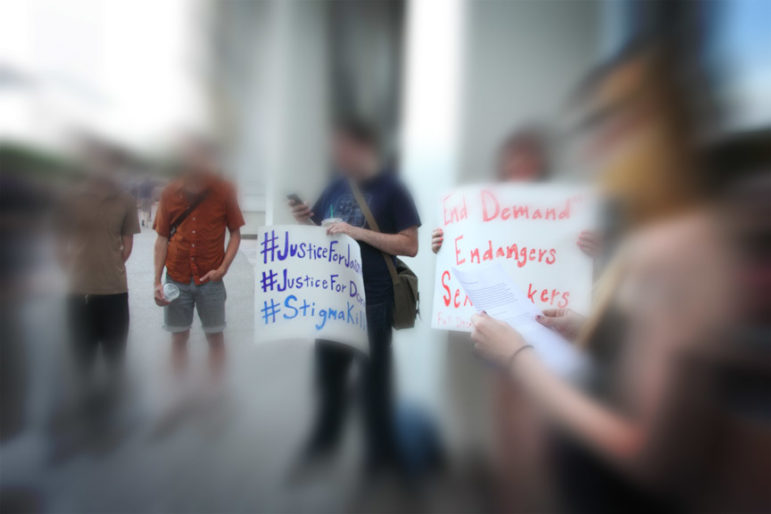
Type 17 Productions
Sex workers rally in 2013. Some sex workers argue that policies aimed at ‘ending demand’ actually increase the risks they face.
Alexi Ashe Meyers and Rebecca Zipkin recently wrote an op-ed where they dismissed sex worker who put their lives on the line advocating for themselves and their communities. I’m one of the voices they warned readers against in their editorial, because I want decriminalization. I’m a sex worker and an undocumented immigrant from Honduras who works with Red Canary Song, an organization that works for immigrant massage parlor workers and DecrimNY, a collective that fights to decriminalize sex work in New York. I went to Albany in May with a hundred other sex workers to push for an elimination of “loitering for the purposes of prostitution” charge, and to vacate all criminal records of sex trafficking victims since they were under force.
I’m constantly told by well-connected and wealthy people that I’m erasing “marginalized women” and “slaves” by speaking, and that they alone understand the issue. There is an irony in predominately wealthy people [who have never done sex work] claiming to be experts on ending global human trafficking/slavery. They willfully ignore the reality that much of what they buy comes from some kind of exploitation, and many of their products are made in sweatshops and by child labor. This myopia occurs because we have decided that big business and profit are more important than human lives. Many Americans are aware that many overseas workers, undocumented immigrants, and prisoners work labor-intensive, low-wage jobs in dangerous conditions so that they won’t have to. Just like the fight for medical care, public housing, public transportation, and education, sex workers are told by those of means that we can wait for justice and equality. Rather than invest in these areas, we increase police spending and send the military to the border handle more “immediate” threats.
Both of the women who wrote this piece work for the Sanctuary for Families in New York City, an organization that generated $27,990,024 in revenue and received $14,671,708 in government grants in 2018, according to GuideStar. Alexi is also co-chair of the New York State Anti-Trafficking Coalition, whose chairperson, Gloria Steinem, vocally protests against sex workers organizing. At one event she promoted for weeks there was anti-trans and anti-surrogacy messaging, with some protesters holding signs of white girls with barcodes over their foreheads to signify slavery. Alexi Ashe Meyers’ husband Seth Meyer helped promote SESTA/FOSTA which has made many of our lives more precarious. The only case of sex trafficking they cite in their article is the Robert Kraft massage parlor scandal in Florida, which had no charges of human trafficking. The women involved were all charged with prostitution, they are in jail, and the police took their property, cell phones, and money. The police were trained in “the end demand” model by nonprofit organizations, and viewed the women like victims. Police installed cameras in the massage parlors, filmed them for six months, and paid to be sexually serviced by the women. Police handcuffed and jailed them, and threatened to release the tapes to the public. Many people don’t pay attention to what prostitution stings actually do.
In 2017, there were a total of 545 cases of human trafficking in the U.S.; 467 were in the sex industry, and 14 cases involved young adults. In comparison, the authorities arrested & charged 28,490 people for prostitution in 2017. Of those arrested, 11,124 were men, and 17,366 were women. Many of my peers in the industry are cis heterosexual men or part of the LGBTQ community. Men in the industry tend to make less money than women, but no attention is paid to the exploitation they face as workers by prohibitionists. Despite men already going to prison (which prohibitionists insist is the real solution to this) the “demand” and the industry are still here, it’s just more dangerous because of criminalization.
Also in 2017, police arrested and charged 185 young adults with prostitution. Police alternatively charge sex workers with vagrancy, curfew and loitering, suspicion, drug possession, and other charges. The vast majority of these teens are terrified of police and don’t want to end up in juvie or the foster care system. Many teens in abusive households or with poor families end up homeless and on the streets. To survive they usually enter into relationships for housing, or enter the sex or drug trade.
Immigrants have it a lot worse. There’s a human trafficking visa called the T visa. In 2017, only 672 people were able to get it. Yet in 2017 ICE ERO (ERO is the division that raids and forcibly deports people) did 143,470 arrests, and 226,119 deportations. Police notoriously don’t always charge sex workers with prostitution, many are charged with loitering, and both of these charges are misdemeanors. ICE can claim they are deporting you for criminal charges.
Criminalization is not only about punishment and policing, but it’s also about how society reinforces criminalization. Sending police to monitor, mediate, or control people is inherently a violent act. People have to justify doing this, by being told these people are different from the rest of society. Law enforcement has endangered the health of sex workers by using condoms as evidence for prostitution and sodomy laws. Yang Song, a Queens massage worker was harassed and died during an NYPD Vice Raid. While I was protesting with Red Canary Song against Peter Koo’s crackdown on massage parlor workers, the NYPD vice division was lecturing the public and politicians claiming that “human trafficking is prostitution.” Prohibitionists often talk about the power imbalance of buyers and sellers in a criminalized market, but they don’t talk about the power imbalance between a cop (an agent of the state) and a criminalized person.
Prohibitionists often use the words legalization and decriminalization interchangeably, which Alexi Meyers and Rebecca Zipkin did in their op-ed. We already have legalized prostitution in Nevada. One person owns all the brothels, because they had enough money to afford property, and to navigate all the regulations. They have a limited number of beds in each brothel. Each sex worker needs to apply, get tested, and be chosen to work at the brothels. They have to be legally allowed to work. They get to stay for a week or a month according to what the owner decides. Within that specific time frame the sex workers are working legally, and 50 percent of everything they make goes to the owner. That means that any sex worker not working in those brothels is working illegally and can still be charged, incarcerated, and deported. Legalized weed works the same way.
Decriminalization would mean something different: We would stop prosecuting people for prostitution, so anything that police would use for that purpose would be stopped. It would no longer be a criminal offense.
What prohibitionists really want is to persecute various parts of the industry; which part depends on whom you talk to. One thing they all have in common is that they want to decriminalize selling (although many of them want to keep criminalizing solicitation, ads, financing), while criminalizing the buying. In places that implemented this policy, sex workers often faced increased discrimination from banks and landlords as well as continued harassment from police and immigration officials. Whether that meant that sex workers couldn’t work together to save money or keep each other safe because it’s “brothel keeping”, or landlords and banks refusing service to sex workers, because they could be charged with “trafficking,” the results are the same: Sex workers are less safe when their work is criminalized.
Despite what prohibitionists will say, their policies are not decriminalization, because they seek to abolish the industry through criminalization. They support criminalization and prohibition, not decriminalization.
Get the best of City Limits news in your inbox.
Select any of our free weekly newsletters and stay informed on the latest policy-focused, independent news.
I’m an “illegal” because of the laws meant to “protect” me. The Immigration Reform and Control Act passed by Ronald Reagan made it illegal to knowingly hire undocumented immigrants. The whole point was to “decrease demand” for “illegals”. It is this exact logic that “end demand” crusaders advocate for with drugs, sex work, and, previously, alcohol. It is deeply wired into the prohibitionist movement, from back when a “moral panic” over “the white slave traffic” was sweeping the U.S. This led to anti-trafficking, anti-immigrant, and restrictive laws against alcohol, and other taboos. Laws like the Mann Act and Page Act are very racist in nature, and tend to persecute poor minorities more than anyone else. Prohibitionists have appropriated chattel slavery and abolitionist language for themselves, despite working with and increasing the prison and police system.
My wish is that the public listen to sex workers. If they wish to help marginalized people, they should listen to those directly impacted by policy.








2 thoughts on “Opinion: A Sex Worker Says Decriminalization Means a Safer Workplace”
I am very happy that surrogacy exists, it was my saving grace and the only chance for me to become a mother! I am so happy now, thanks to the Feskov clinic in Ukraine and the surrogate mother!
Are you talking about this clinic? https://www.mother-surrogate.com/